Sociology Essay: Factors Influencing School Start Age for Children
VerifiedAdded on 2023/01/03
|5
|1085
|61
Essay
AI Summary
This sociology essay examines the multifaceted issue of the ideal age for children to begin schooling. The essay begins by highlighting the varying age cutoffs across different states in Australia, sparking a debate on readiness. It delves into factors such as readiness, considering how schools and families define it, and the emotional and social skills expected of children. The essay further evaluates the importance of relationships, transition activities, and approaches to learning and teaching, including the role of teachers and the nature of homework. Power dynamics, like opportunities for classroom engagement, are also considered. The conclusion emphasizes that chronological age is a crude indicator and that social, cultural, and contextual factors are critical in determining the appropriate time for a child to start school, recognizing that childhood educators and families may have differing perspectives. The essay references several academic sources.
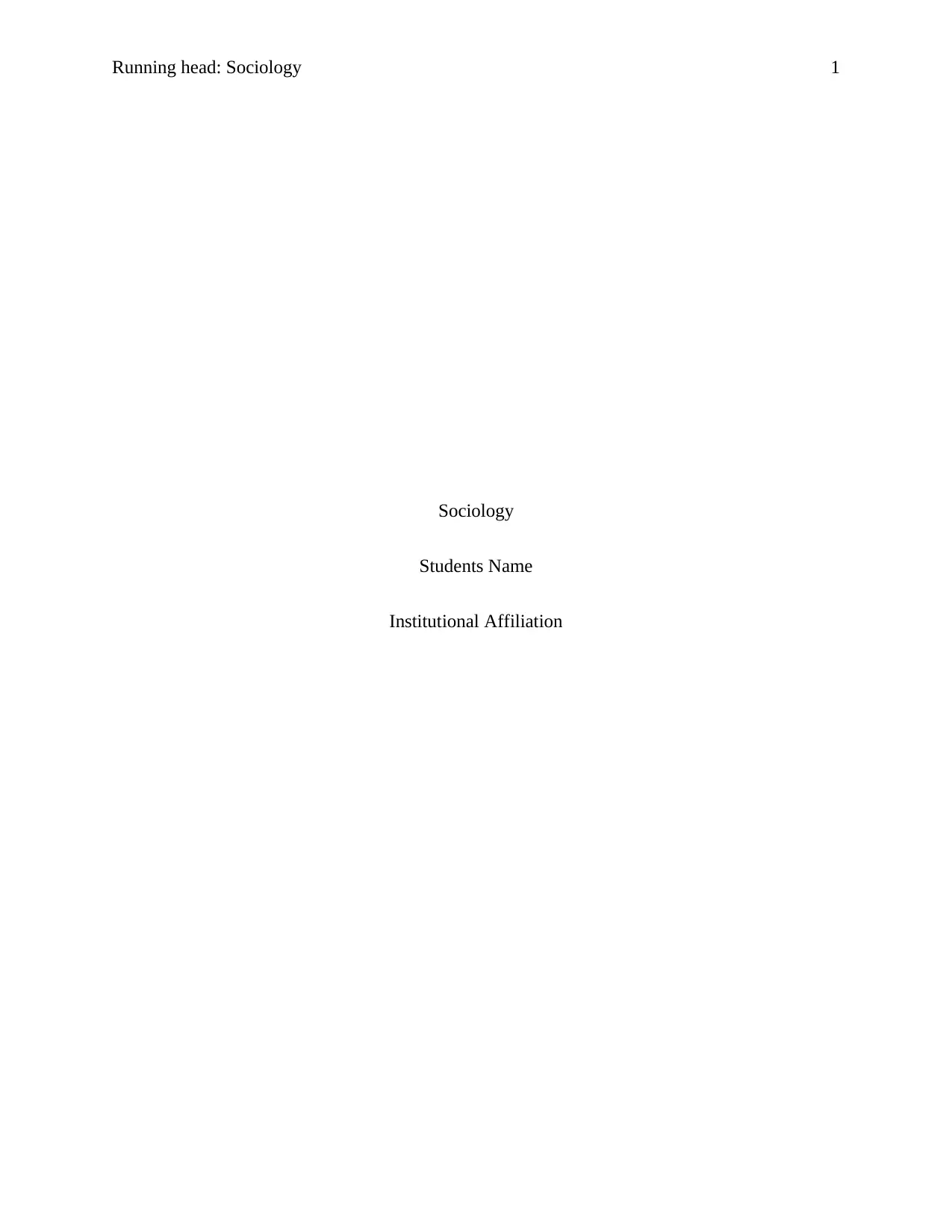
Running head: Sociology 1
Sociology
Students Name
Institutional Affiliation
Sociology
Students Name
Institutional Affiliation
Paraphrase This Document
Need a fresh take? Get an instant paraphrase of this document with our AI Paraphraser
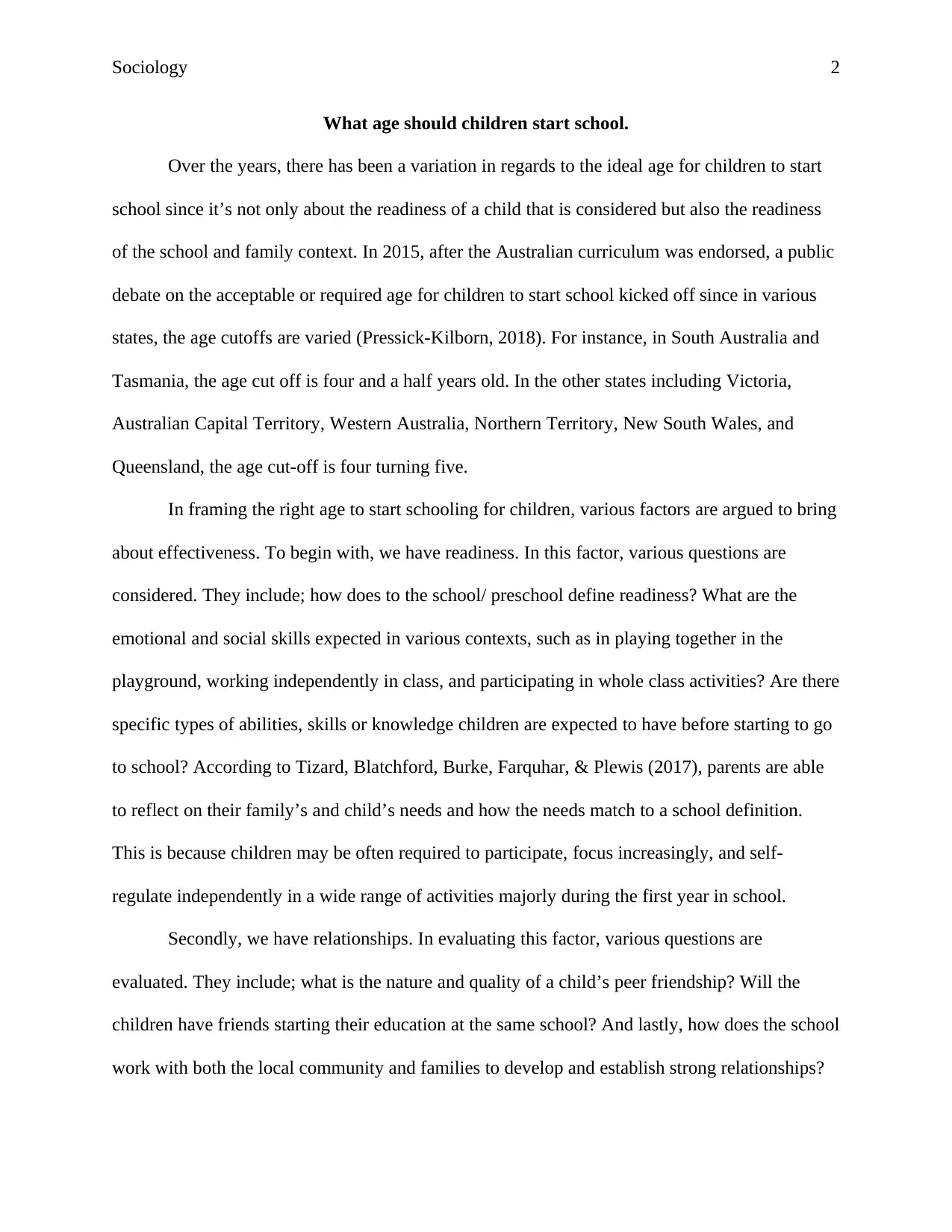
Sociology 2
What age should children start school.
Over the years, there has been a variation in regards to the ideal age for children to start
school since it’s not only about the readiness of a child that is considered but also the readiness
of the school and family context. In 2015, after the Australian curriculum was endorsed, a public
debate on the acceptable or required age for children to start school kicked off since in various
states, the age cutoffs are varied (Pressick-Kilborn, 2018). For instance, in South Australia and
Tasmania, the age cut off is four and a half years old. In the other states including Victoria,
Australian Capital Territory, Western Australia, Northern Territory, New South Wales, and
Queensland, the age cut-off is four turning five.
In framing the right age to start schooling for children, various factors are argued to bring
about effectiveness. To begin with, we have readiness. In this factor, various questions are
considered. They include; how does to the school/ preschool define readiness? What are the
emotional and social skills expected in various contexts, such as in playing together in the
playground, working independently in class, and participating in whole class activities? Are there
specific types of abilities, skills or knowledge children are expected to have before starting to go
to school? According to Tizard, Blatchford, Burke, Farquhar, & Plewis (2017), parents are able
to reflect on their family’s and child’s needs and how the needs match to a school definition.
This is because children may be often required to participate, focus increasingly, and self-
regulate independently in a wide range of activities majorly during the first year in school.
Secondly, we have relationships. In evaluating this factor, various questions are
evaluated. They include; what is the nature and quality of a child’s peer friendship? Will the
children have friends starting their education at the same school? And lastly, how does the school
work with both the local community and families to develop and establish strong relationships?
What age should children start school.
Over the years, there has been a variation in regards to the ideal age for children to start
school since it’s not only about the readiness of a child that is considered but also the readiness
of the school and family context. In 2015, after the Australian curriculum was endorsed, a public
debate on the acceptable or required age for children to start school kicked off since in various
states, the age cutoffs are varied (Pressick-Kilborn, 2018). For instance, in South Australia and
Tasmania, the age cut off is four and a half years old. In the other states including Victoria,
Australian Capital Territory, Western Australia, Northern Territory, New South Wales, and
Queensland, the age cut-off is four turning five.
In framing the right age to start schooling for children, various factors are argued to bring
about effectiveness. To begin with, we have readiness. In this factor, various questions are
considered. They include; how does to the school/ preschool define readiness? What are the
emotional and social skills expected in various contexts, such as in playing together in the
playground, working independently in class, and participating in whole class activities? Are there
specific types of abilities, skills or knowledge children are expected to have before starting to go
to school? According to Tizard, Blatchford, Burke, Farquhar, & Plewis (2017), parents are able
to reflect on their family’s and child’s needs and how the needs match to a school definition.
This is because children may be often required to participate, focus increasingly, and self-
regulate independently in a wide range of activities majorly during the first year in school.
Secondly, we have relationships. In evaluating this factor, various questions are
evaluated. They include; what is the nature and quality of a child’s peer friendship? Will the
children have friends starting their education at the same school? And lastly, how does the school
work with both the local community and families to develop and establish strong relationships?
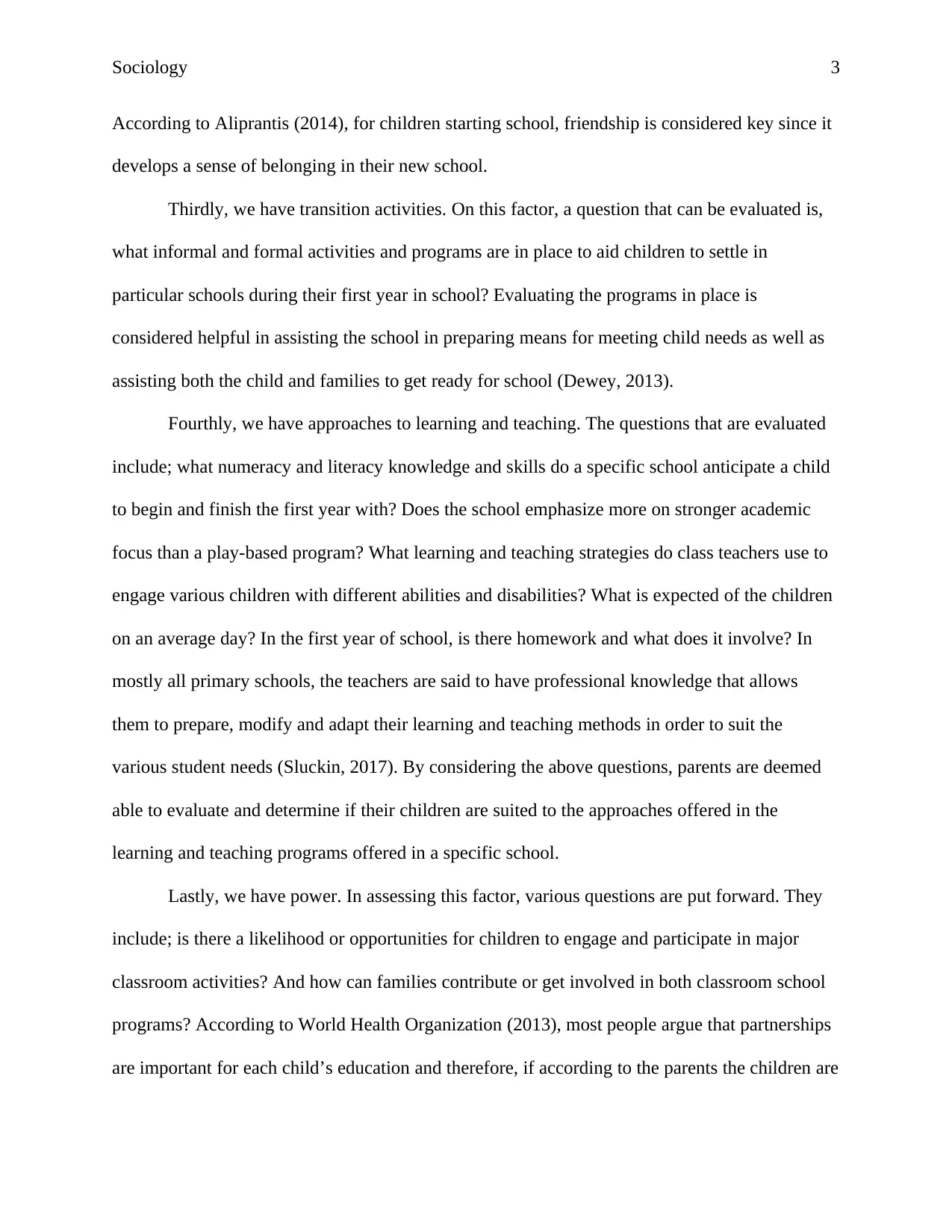
Sociology 3
According to Aliprantis (2014), for children starting school, friendship is considered key since it
develops a sense of belonging in their new school.
Thirdly, we have transition activities. On this factor, a question that can be evaluated is,
what informal and formal activities and programs are in place to aid children to settle in
particular schools during their first year in school? Evaluating the programs in place is
considered helpful in assisting the school in preparing means for meeting child needs as well as
assisting both the child and families to get ready for school (Dewey, 2013).
Fourthly, we have approaches to learning and teaching. The questions that are evaluated
include; what numeracy and literacy knowledge and skills do a specific school anticipate a child
to begin and finish the first year with? Does the school emphasize more on stronger academic
focus than a play-based program? What learning and teaching strategies do class teachers use to
engage various children with different abilities and disabilities? What is expected of the children
on an average day? In the first year of school, is there homework and what does it involve? In
mostly all primary schools, the teachers are said to have professional knowledge that allows
them to prepare, modify and adapt their learning and teaching methods in order to suit the
various student needs (Sluckin, 2017). By considering the above questions, parents are deemed
able to evaluate and determine if their children are suited to the approaches offered in the
learning and teaching programs offered in a specific school.
Lastly, we have power. In assessing this factor, various questions are put forward. They
include; is there a likelihood or opportunities for children to engage and participate in major
classroom activities? And how can families contribute or get involved in both classroom school
programs? According to World Health Organization (2013), most people argue that partnerships
are important for each child’s education and therefore, if according to the parents the children are
According to Aliprantis (2014), for children starting school, friendship is considered key since it
develops a sense of belonging in their new school.
Thirdly, we have transition activities. On this factor, a question that can be evaluated is,
what informal and formal activities and programs are in place to aid children to settle in
particular schools during their first year in school? Evaluating the programs in place is
considered helpful in assisting the school in preparing means for meeting child needs as well as
assisting both the child and families to get ready for school (Dewey, 2013).
Fourthly, we have approaches to learning and teaching. The questions that are evaluated
include; what numeracy and literacy knowledge and skills do a specific school anticipate a child
to begin and finish the first year with? Does the school emphasize more on stronger academic
focus than a play-based program? What learning and teaching strategies do class teachers use to
engage various children with different abilities and disabilities? What is expected of the children
on an average day? In the first year of school, is there homework and what does it involve? In
mostly all primary schools, the teachers are said to have professional knowledge that allows
them to prepare, modify and adapt their learning and teaching methods in order to suit the
various student needs (Sluckin, 2017). By considering the above questions, parents are deemed
able to evaluate and determine if their children are suited to the approaches offered in the
learning and teaching programs offered in a specific school.
Lastly, we have power. In assessing this factor, various questions are put forward. They
include; is there a likelihood or opportunities for children to engage and participate in major
classroom activities? And how can families contribute or get involved in both classroom school
programs? According to World Health Organization (2013), most people argue that partnerships
are important for each child’s education and therefore, if according to the parents the children are
⊘ This is a preview!⊘
Do you want full access?
Subscribe today to unlock all pages.

Trusted by 1+ million students worldwide
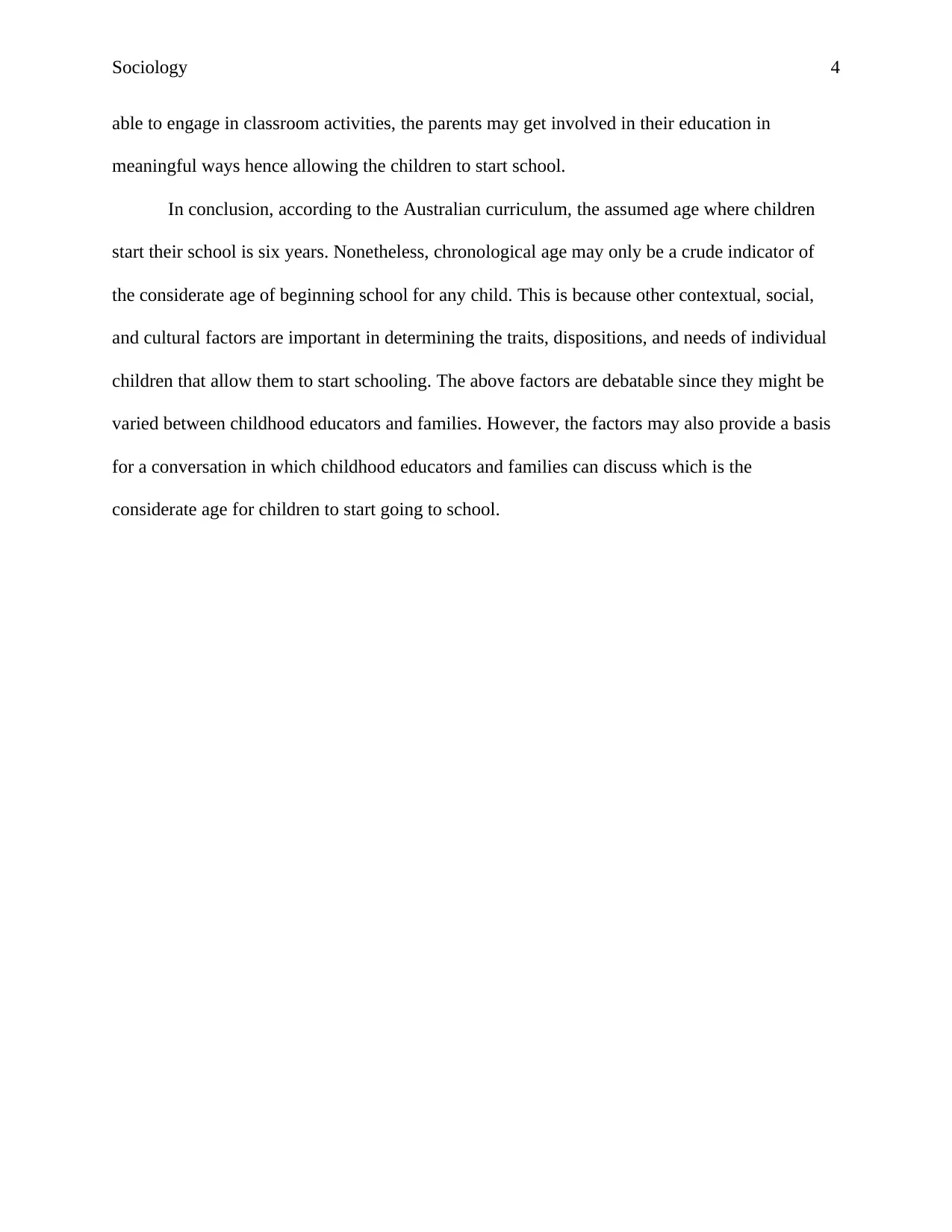
Sociology 4
able to engage in classroom activities, the parents may get involved in their education in
meaningful ways hence allowing the children to start school.
In conclusion, according to the Australian curriculum, the assumed age where children
start their school is six years. Nonetheless, chronological age may only be a crude indicator of
the considerate age of beginning school for any child. This is because other contextual, social,
and cultural factors are important in determining the traits, dispositions, and needs of individual
children that allow them to start schooling. The above factors are debatable since they might be
varied between childhood educators and families. However, the factors may also provide a basis
for a conversation in which childhood educators and families can discuss which is the
considerate age for children to start going to school.
able to engage in classroom activities, the parents may get involved in their education in
meaningful ways hence allowing the children to start school.
In conclusion, according to the Australian curriculum, the assumed age where children
start their school is six years. Nonetheless, chronological age may only be a crude indicator of
the considerate age of beginning school for any child. This is because other contextual, social,
and cultural factors are important in determining the traits, dispositions, and needs of individual
children that allow them to start schooling. The above factors are debatable since they might be
varied between childhood educators and families. However, the factors may also provide a basis
for a conversation in which childhood educators and families can discuss which is the
considerate age for children to start going to school.
Paraphrase This Document
Need a fresh take? Get an instant paraphrase of this document with our AI Paraphraser
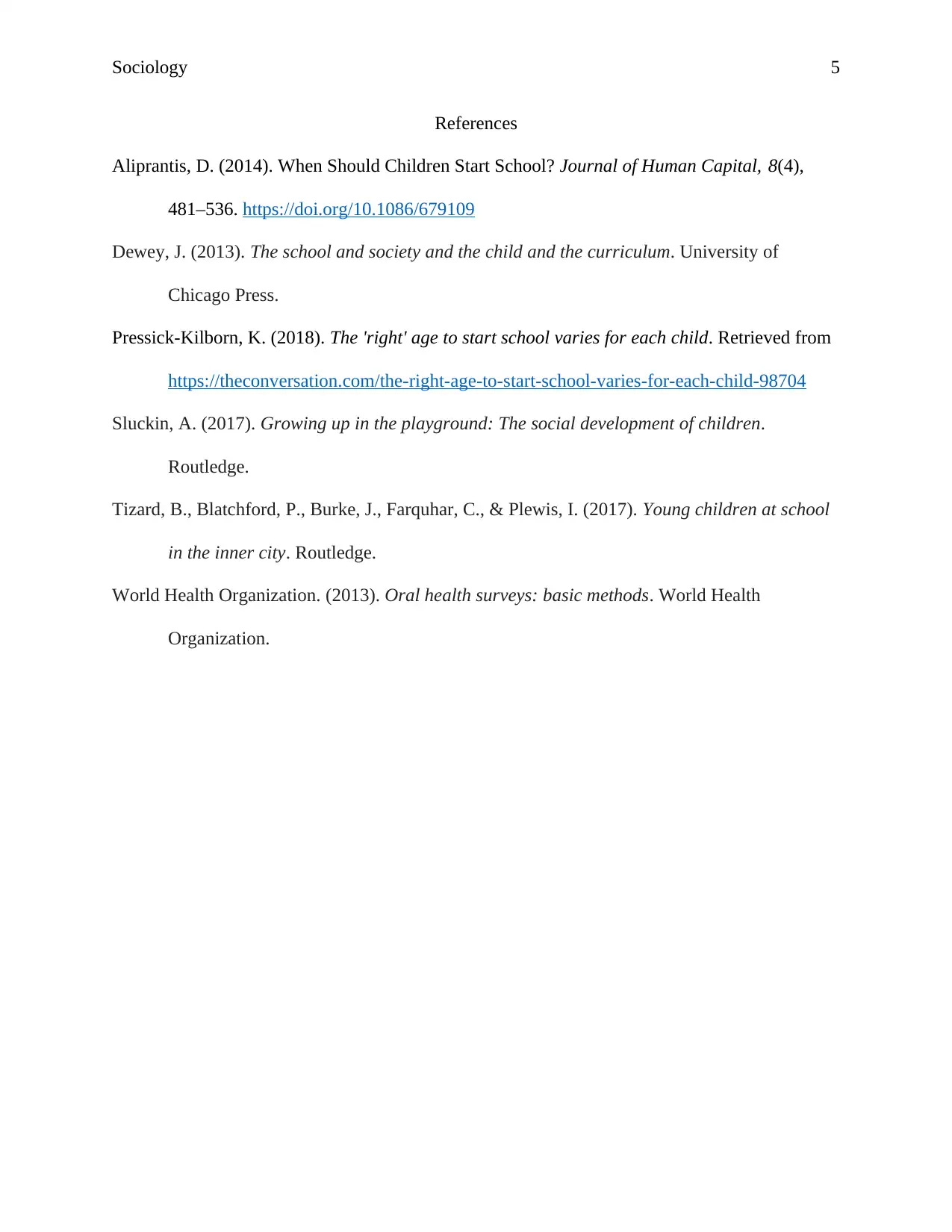
Sociology 5
References
Aliprantis, D. (2014). When Should Children Start School? Journal of Human Capital, 8(4),
481–536. https://doi.org/10.1086/679109
Dewey, J. (2013). The school and society and the child and the curriculum. University of
Chicago Press.
Pressick-Kilborn, K. (2018). The 'right' age to start school varies for each child. Retrieved from
https://theconversation.com/the-right-age-to-start-school-varies-for-each-child-98704
Sluckin, A. (2017). Growing up in the playground: The social development of children.
Routledge.
Tizard, B., Blatchford, P., Burke, J., Farquhar, C., & Plewis, I. (2017). Young children at school
in the inner city. Routledge.
World Health Organization. (2013). Oral health surveys: basic methods. World Health
Organization.
References
Aliprantis, D. (2014). When Should Children Start School? Journal of Human Capital, 8(4),
481–536. https://doi.org/10.1086/679109
Dewey, J. (2013). The school and society and the child and the curriculum. University of
Chicago Press.
Pressick-Kilborn, K. (2018). The 'right' age to start school varies for each child. Retrieved from
https://theconversation.com/the-right-age-to-start-school-varies-for-each-child-98704
Sluckin, A. (2017). Growing up in the playground: The social development of children.
Routledge.
Tizard, B., Blatchford, P., Burke, J., Farquhar, C., & Plewis, I. (2017). Young children at school
in the inner city. Routledge.
World Health Organization. (2013). Oral health surveys: basic methods. World Health
Organization.
1 out of 5
Related Documents
Your All-in-One AI-Powered Toolkit for Academic Success.
+13062052269
info@desklib.com
Available 24*7 on WhatsApp / Email
![[object Object]](/_next/static/media/star-bottom.7253800d.svg)
Unlock your academic potential
Copyright © 2020–2026 A2Z Services. All Rights Reserved. Developed and managed by ZUCOL.




